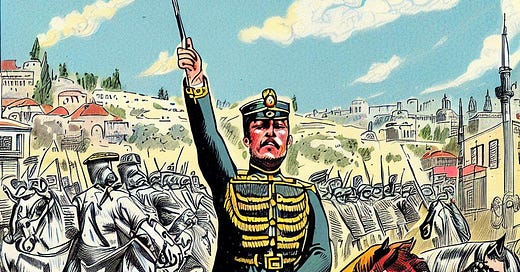Review: 'Omer Pasha Latas: Marshal to the Sultan' by Ivo Andrić (trans. C. Hawkesworth), NYRB, 2018 (org. c. 1975)
"Misery, illness, ignorance, all kinds of ugliness"
Sarajevo is not a city of crime ... one could rather say that it is a city of hate, and hate easily finds new causes and confirmation to justify it everywhere.
Omer Pasha Latas is a book of numerous themes and, being unfinished, it is unfortunate that Andrić, was unable to bring them to the intended inclusion. Despite this, Andrić’s Bosnian/Ottoman tale (the author being a commited Yugoslav of the non-Communist variety) set in the mid-nineteenth century seems to have lost none of its potency and the quote above encapsulates what I believe to be one of his most poignant observations. Although tied together by the events pertaining to Omer Pasha’s arrival at the head of a new, modernised Ottoman army, this book has been elsewhere described aptly as a series of vignettes, where Andrić compellingly explores the, quite frankly, depressing reality faced by the eclectic group of individuals that found themselves caught up in the hostile, bloody relationship of an imperial power and its wild frontier province.
No character, no matter how sympathetic (a fairly rare occurrence in this book) escapes the concoction of hatred, disdain and hypocrisy that seems a draught imbibed from Bosnia’s very air. Hatred, for all those that have wronged them (justified or otherwise). Disdain, for all those that are beneath them in either rank, ethnicity, religion or provenance. Hypocrisy, the result of high ideals that are either unsustainable in their current environment or never truly believed in the first place, but are nonetheless spewed out as mantras to justify their means. In so many cases throughout the book and, one suspects, in reality, this only ends in madness, despair and, not infrequently, death. If there is one conclusion that is to be drawn from the events described, it is that suffering does not strengthen a person, it chips away at their very being until, in a desperate and hopeless moment, it breaks them finally and utterly.
In a way that is equal parts disheartening and impressive, the doom and gloom of Andrić’s Bosnia never feels ham-fisted but always as a bitterly believable state of affairs. Indeed, the role of Bosnia itself in creating this atmosphere is a fascinatingly complex one. To those suffering, particularly amongst those from further afield, Bosnia is the cause of their misfortune. In Omer Pasha's entourage, Bosnia is the enemy that must be tamed and it seems that the very land, in addition to its people, seeks to eject them and lay them low. Their lives, once at least tolerable if not actually enjoyable, seem to deteriorate all the more acutely. Andrić does a marvellous job in undermining this assumption made by his characters, even when writing from their point of view. When recounting their lives, it becomes obvious that the maladies of the soul that infest the Pasha's family and associates had taken hold long before their arrival in Bosnia. In the case of Omer Pasha’s brother, Nikola, this is perhaps a little on the nose as his internal sickness is mirrored by an obligatory bout of nineteenth century tuberculosis.
When considering the above, it is rather difficult not to consider Bosnia and Sarajevo as characters themselves. At times insidious (the Ottoman perpective), at times possessing a strange, wild beauty and most frequently, as places to be pitied. The latter is, by far, the most persistent. Andrić constantly reminds his reader that this is not the first time a conquering army has laid waste to this land and its people, whose memories of the last violation are never too far away from the present public consciousness. The Bosnia that is painted here, quite literally by the damaged Zagrebian artist, Karas, is not one that is the cause of its own misfortune, though ravaged and destitute, but one of a nation whose people have hardened around the fact that their fatherland is forever destined to the battleground of not only temporal empires but the higher war for hearts, souls and identities of its denizens.
It is not lost on me that one cannot study this book entirely in the isolation of the period it portrays. As William Vollmann states in the introduction to the NYRB translation, Andrić and his writings have a profound place in the cultural narrative of later Yugoslavia and the bitter conflict that surrounded its dissolution, long after the author himself had died. I am of an age where I am too young for the war of the 1990s to hold too great a place in my consciousness and I must confess to a more general ignorance of the region's modern history. It is for those reasons, though I am aware of the debate, that I shall not venture to comment on whether I find Andrić’s presentation of Bosnia as chauvinistic, though it is a discussion that I would be interested to better understand.
What I am willing to state, however, is that this book serves as a poignant and melancholic reminder that, even for those of us where life seems routine, comfortable and indefinite, the world is constantly in flux and a single, perhaps seemingly minor, event might lead to collapse. Collapse, however, is just as temporary as stability and when the pillars of high ideals, self-conceit and zeal have come crashing down, there will remain the foundations: common people, with or upon whom new pillars might be built. As Omer Pasha’s army marches out of Sarajevo, soiled and tarnished where before it had gleamed with imperial 'progress', Bosnia's people yet endure, ready to continue their lives despite the devastation and death that comes for them like the seasons.
Want to read more reviews like this? Want to get involved in the discussion? Press the button below to subscribe to ‘The Cobbles’ for further reviews and more.




